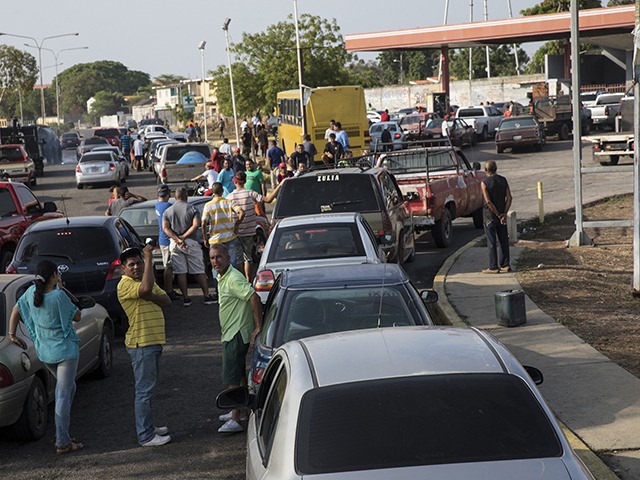People in Venezuela have faced widespread gasoline shortages since Monday despite boasting some of the world’s largest oil reserves because the socialist regime failed to distribute supplies to fuel stations on time.
In the capital of Caracas, which as the political center of Venezuela is usually prioritized for gas deliveries, many gas stations reportedly had large queues with drivers waiting up to an hour to refuel. In states such as Lara and Táchira, many drivers have been forced to arrive in the early hours of the morning to guarantee access to fuel. In some cases, gas stations were closed entirely due to a lack of supplies.
The general secretary of the Petroleum Workers Union, Iván Freites, said in an interview with El Nacional that the failure to provide fuel was a result of the paralyzation of many of the country’s oil refineries, all of which are controlled by the state-run oil company Petroleum of Venezuela (PDSVA).
Despite having the largest oil reserves in the world after the United States, shortages of gasoline have in recent years become part and parcel of life for ordinary Venezuelans. Following his election in 1998, dictator Hugo Chávez nationalized the country’s thriving oil industry and promoted heavy fuel subsidies as an integral part of his socialist revolution. Due to stratospheric hyperinflation, the cost of gasoline is now equivalent to just a fraction of a cent.
The company’s nationalization and consequent mismanagement have led to chronic inefficiencies and an exodus of workers that has crippled its oil output. Last year, oil production fell to a 30-year low of under one million barrels per day (BPD_, compared with 3.2 million BPD when he took power. Last year, the International Energy Agency also warned that the industry was on the brink of total collapse.
As a result, the Maduro regime has been forced to import its fuel from authoritarian allies such as Russia and China but continues to struggle to make its payments on time or at all. According to Refinitiv Eikon tanker tracking data and internal PDVSA documents seen by Reuters, fuel imports fell from 210,000 BPD in October to 135,000 BPD in November.
Since March last year, Venezuela has also experienced repeated power cuts that have crippled its basic ability to function, also forcing the closure of schools, hospitals, and other essential public services. Maduro has repeatedly blamed the blackouts on a supposed attack by the U.S. on the country’s electrical grid aimed at undermining his regime, although he has never provided any evidence for such claims.
Follow Ben Kew on Facebook, Twitter at @ben_kew, or email him at bkew@breitbart.com.

COMMENTS
Please let us know if you're having issues with commenting.